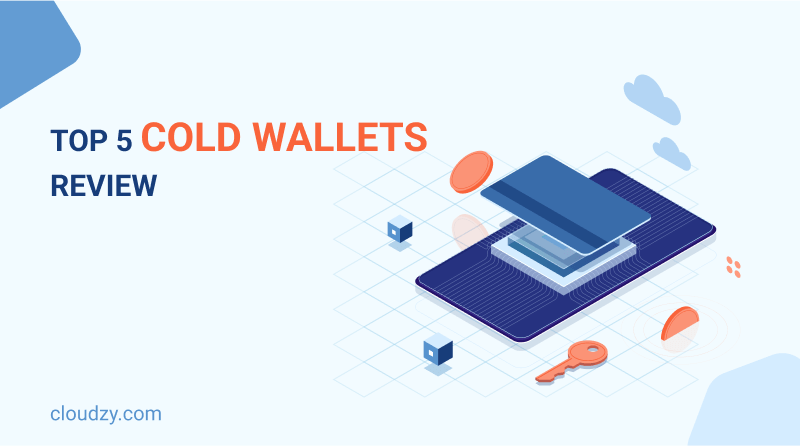💡 Note: Safeguarding cryptocurrencies is crucial. Cloudzy VPS offers a secure, stable, and reliable environment for your crypto wallet, blending convenience with high security. With advanced protection, ensure your digital assets are safe from cyber threats.
In the realm of cryptocurrencies, ensuring the security of one’s assets is crucial. A cold storage wallet is a specific type of cryptocurrency wallet that aims to provide extra security by storing private keys offline, making it more difficult for cybercriminals to access one’s digital assets. In contrast to hot wallets, which are internet-connected and therefore prone to hacking and security threats, cold wallets offer a safer and more secure storage option. With a variety of cold wallet options available, each with unique features and benefits, selecting the appropriate one is essential to protect your digital assets.
There are many different cold storage wallets that are accessible in the market, each with distinct characteristics and advantages. This blog post aims to first thoroughly cover the definition, use cases, and pros and cons of a cold wallet before delving into the five most outstanding cold storage wallet options that provide the utmost level of security and user-friendliness.
What Is a Cold Wallet?
A cold storage wallet is a type of cryptocurrency wallet designed to store private keys offline, providing an added layer of security against hacking, malware attacks, and other security threats. Private keys are used to access and manage cryptocurrency assets. By storing them offline, cold wallets make it more difficult for malicious actors to gain access to your digital assets.
Hardware wallets are the most popular and come in the form of small, physical devices, similar to USB drives, which store private keys. Paper wallets are simply printed copies of the private key and are considered one of the most secure forms of cold wallets, but they can be lost or damaged easily.
Cold wallets offer several advantages over hot wallets. They are more secure and provide peace of mind, knowing that your digital assets are stored offline. However, it’s important to note that cold wallets may be less convenient to use than hot wallets, which can be more challenging for new users to navigate. It’s also crucial to keep backup copies of your private key in case of loss or damage to the cold wallet.
Cold Wallet Use Cases
Cold wallets are used differently based on what their owners expect. If these use cases do not apply to your intentions in the cryptocurrency world, it’s better to stick with hot wallets!
1. Long-Term Security
If you aim to store your digital assets, namely cryptocurrencies on a cold wallet, then making it long-term is the best course of action. This comes down to two essential characteristics of a cold storage wallet. First is the fact that cold wallets can be quite expensive, starting at approximately $50. So naturally, you are going to be investing a large amount that justifies the original entry price. Secondly, the security element of a cold wallet makes it the only logical storage solution for large sums of crypto to be stored safely with no worries.
2. Foolproof Against Malware and Virus
Guess where malware and viruses attack your financial assets? That’s right, the internet. Now, if you were to dislodge your digital assets’ access key from the internet, there is nothing to be hacked by malware and virus, right? So unless they hack the blockchain itself (which is impossible), there is simply no way for your crypto savings to be threatened on a cold wallet via online channels
3. Storing Different Assets
If you think the so-called cold wallets are only used to store large, long-term cryptocurrencies, you are in for a surprise. The sole difference between a cold wallet and a hot wallet is the fact that it keeps the access keys off the online space. So pretty much everything that can be stored on a blockchain is fair game when it comes to using a cold storage wallet to keep them. This includes online ownership certificates, tokens, artworks, NFTs, etc. So if you have high-value assets other than crypto that are stored on a blockchain and you want to keep them as a long-term investment, then cold wallets are the best option here as well.
4. Advanced Backup and Recovery
The providers of cold storage wallets do recognize the fact that cold wallets, in case of slippage, can lead to the loss of huge amounts of assets. Since blockchain networks and the crypto world primarily runs on personal responsibility, and you are your own banker, then this loss can also be irreversible. So, many of the best cold wallet providers go to great lengths to provide you with recovery and backup utilities, sometimes even beyond what hot wallets offer.
5. Offline Transactions
Everybody is more lax when there is no tax, right? Offline, hand-to-hand transactions have been the most foolproof, secure, and sound method of barter and trade since the beginning of human civilization, and it is also not taxable. This makes it perfect for off-the-grid and anonymous financial transactions or for cases where you want to give a large monetary gift or donative.
Potential Disadvantages of a Cold Storage Wallet
Now that we are familiar with a cold wallet’s advantages and use cases, it’s good to know some of its potential advantages. None of these “cons” are really hindering if you are truly going to use a cold storage wallet for what it is meant to be used as, a long-term, secure, transactionally limited investment.
1. Costs
Cold wallets can be expensive, especially when hot wallets are often free. This means you must allocate a large enough sum to your cold wallet to justify the original payment price. This amount is usually multiple times larger than the price of a cold wallet.
2. Learning Curve
Using a cold wallet can be a bit more complex than using a hot wallet and may require some technical knowledge to correctly operate and handle. Otherwise, you risk falling into the next con on the list.
3. Potential for Physical Loss or Damage
Like any physical device, cold wallets can be lost or damaged, resulting in lost funds if backup and recovery processes are not followed properly. As I mentioned earlier, there are usually advanced backup and recovery methods on the offer. Still, ultimately, you seal your own fate with how careful you are with your offline access keys.
4. Limited Accessibility
Since cold wallets are physical devices, they are not as easily accessible as hot wallets, which can be accessed from anywhere with an internet connection. This hinders the operational capacity to move the funds smoothly online. While offline transactions were mentioned as a utility of cold storage wallets, there is another side to this con as well.
Cold Wallet vs. Hot Wallet: Which One Is for You?
The cold wallet vs. hot wallet discussion is quite complicated, but I will attempt to break it down briefly in this section. Since a cold storage wallet is a physical device or hardware wallet not connected to the internet, it is considered more secure. As private keys are stored offline, cold wallets are less susceptible to hacking or online attacks and are ideal for the long-term storage of cryptocurrencies. So if you plan to hold (or Hodl, as some crypto fans say), it is the best option for you. Just make sure that you take good care of your offline access keys.
On the other hand, a hot wallet, with its software-based architecture, is connected to the internet. It is also known as an online wallet, allowing users to access their funds at any time from any device with an internet connection. Hot wallets can be accessed through a web browser or a mobile app, which are convenient for frequent trading or transactions. Use them for day trading and handling small to medium amounts of crypto. They are not ideal for long-term savings. Knowing more about the best crypto trading bots is a good place to enable yourself to counter this issue.
Top 5 Best Cold Storage Wallets
Now we finally get to ranking the top five best hardware wallet options. This ranking is in no particular order. It aims to represent all sorts of cold storage wallet options as part of it to give you a host of options and diversity in choice.
Ledger Nano X
The Ledger Nano X is a cold hardware wallet that’s favored by many for storing various cryptocurrencies, such as Ethereum, Bitcoin, and other Altcoins. It’s the latest device in the Nano series, following the Nano S.
Ledger Nano X is highly secured by a chip certified for security and a custom OS that shields your private keys from being hacked or facing other potential threats. It utilizes a recovery phrase and a PIN code to keep your account safe. Nano X links to your computer or mobile using Bluetooth or a USB cable, which enables you to manage your cryptocurrencies from any internet-enabled location. Nano X also features a small display screen, making navigating the device and confirming transactions easy.
Nano X also allows using several cryptocurrency applications, making it easy to store, send, and receive different cryptocurrencies. It adopts a 24-word recovery seed phrase that allows you to restore your funds if the device is lost, stolen, or damaged. Overall, the Ledger Nano X cold storage wallet is highly regarded for its robust security, versatile use, and user-friendly design, making it one of the best hardware wallet options out there.
KeepKey
KeepKey is another great choice when it comes to the best cold storage wallet options. KeepKey offers a single cold wallet device, which may seem shabby compared to Ledger and its roster of different shiny models. However, this uni-dimensional approach to the product is quickly justified when you consider that KeepKey is an all-in-one package with its own standalone application and support for almost all common cryptocurrencies in the world.
It features PIN protection and a 12, 18, or 24-word recovery phrase, depending on your choice, to seal your security. It is also as transaction-friendly as a cold wallet can get. It allows you to perform transactions through its applications and has a unique interface to schedule transactions in advance. If you want to buy a single cold storage wallet that handles everything for you, KeepKey is the one.
ColdCard
ColdCard is a Bitcoin hardware wallet that is designed to provide top-of-the-line security for storing Bitcoin, and Bitcoin Only. ColdCard is the perfect fit for Bitcoin purists who only believe in this cryptocurrency and prefer to hold this coin for extended periods of time. The ColdCard mark4 is the latest ColdCard cold storage wallet, and it allows you to start keeping your Bitcoin safely without ever having to use a computer. It uses the native PSBT (BIP174) algorithm on the Bitcoin blockchain.
ColdCard is known for its advanced security features, including secure element chips, which protect your private keys and transactions. It has a PIN code system and a built-in tamper-proof mechanism that erases the device’s memory if an attempt to break into it is detected. ColdCard’s focus on Bitcoin allows it to provide a high level of security, as it can enhance Bitcoin’s specific requirements.
BitBox02
Produced and supported by Shift, BitBox02 is another cold storage wallet that is entirely focused on its compact build and its compatibility via the USB-C outlet it comes with. This, however, does not mean that other aspects of the wallet are compromised. For example, when it comes to security, Shift is assured of their capability that they have made the source code of their BitBox02 wallet publicly available. Despite many attempts to crack it, nobody has managed to perform this task to date.
It comes with its own app and has two different versions, one with Bitcoin-only networking and the other featuring 1500+ cryptos.
Trezor Model T
The Trezor Model T is an advanced version of the original Trezor One wallet and focuses on being as user-friendly as possible. The Model T has a 240×240 pixel color touchscreen display, which allows you to easily navigate through the device’s menus and options. The display also shows transaction details, including the amount and recipient address, before you confirm a transaction.
The Model T connects to your computer or mobile device via USB or Bluetooth, which means that you can use it with a wide range of devices, including desktops, laptops, smartphones, and tablets. The Trezor Model T supports over 1,000 cryptocurrencies, including all major coins like Bitcoin, Ethereum, Litecoin, and Ripple, as well as many altcoins and ERC-20 tokens.
The Model T has a user-friendly interface that is easy to navigate, even for users who are new to hardware wallets. Trezor Model T is a great place to start if you are new to using cold storage.
Conclusion
In conclusion, utilizing a cold storage wallet is vital for safeguarding your cryptocurrency assets. Cold wallets, which store private keys offline, offer additional protection from cyberattacks and hackers. Hardware wallets are generally considered the most secure type of cold wallet. When selecting a cold wallet, it’s essential to consider factors such as security, compatibility, ease of use, and pricing.
FAQ
Are cold wallet crypto options completely secure?
While cold wallets are considered more secure than hot wallets, they are not entirely foolproof. It’s important to take additional measures, such as setting a strong password and enabling two-factor authentication to ensure maximum security.
Can I store all types of cryptocurrency in a cold wallet?
This depends on the specific cold wallet you choose. It’s important to check the compatibility of a cold wallet with the specific cryptocurrencies you plan to store before making a purchase.
How do I back up my cold storage crypto wallet?
It’s essential to back up your cold wallet to ensure that you can access your funds if the device is lost or damaged. Most cold wallets come with a recovery seed or phrase, which is used to restore access to your funds if needed.





One thought on “What Is a Cold Wallet? 5 Best Cold Storage Wallets”
A fascinating discussion is definitely worth comment. I believe that you ought to write more on this subject, it may not be a taboo
matter but generally folks don’t discuss such issues.
To the next! Kind regards!!